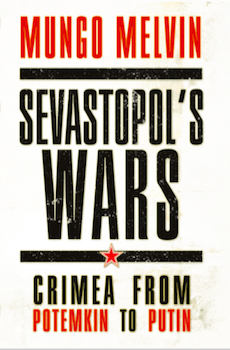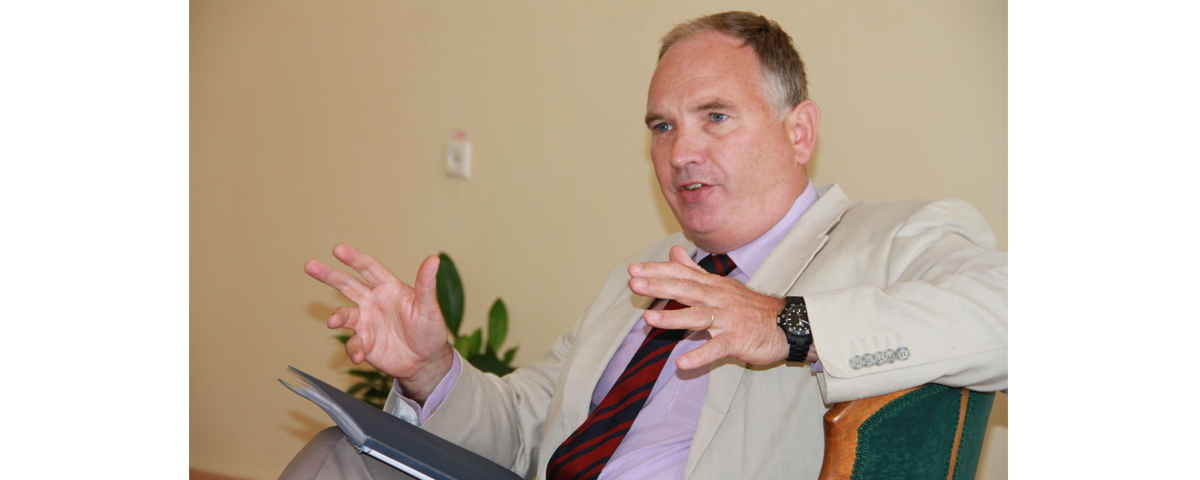MAJOR GENERAL MUNGO MELVIN is a retired senior British Army officer with considerable experience in the analysis of operations and joint professional military education. He saw operational service in Northern Ireland, the Middle East, and the Balkans. He was previously the president of the British Commission for Military History, and is currently a senior associate fellow of the Royal United Services Institute, and a senior visiting research fellow of the war studies department of King’s College London. He teaches military history and strategy, and mentors both civilian and military groups. His award-winning book Manstein: Hitler’s Greatest General was published in the United States in 2011. His latest book, Sevastopol’s Wars: Crimea from Potemkin to Putin, will be available April 18th.
 1) Your latest book is about the military history of Sevastopol, the largest city on the Crimean Peninsula. What led you to write a book on that topic?
1) Your latest book is about the military history of Sevastopol, the largest city on the Crimean Peninsula. What led you to write a book on that topic?
I became fascinated by Sevastopol when I was writing Manstein: Hitler’s Greatest General, which was published in 2010. Manstein conquered Crimea in the autumn of 1941—the city of Sevastopol, however, held out until early July 1942. Apart from its strategic significance in the Second World War, I was drawn to studying Sevastopol on account of its earlier defense during the Crimean War, 1854–1855. I visited the city on many occasions between 2007 and 2013, getting to know not only its history and heritage but also learning about its geography and special “spirit”—a term coined by [Leo] Tolstoy when he served there.
2) What do you think the future holds for Sevastopol? Do you have any thoughts on the Russian annexation?
Sevastopol became a Russian city in 1783 when it was founded by the Russo-Scot, Rear Admiral Thomas Mackenzie, at the behest of Catherine the Great and her plenipotentiary for South Russia, Prince Grigory Potemkin. At the same time Russia had annexed the entire Crimean peninsula, ousting the Crimean Tatar leadership. Sevastopol remained part of Russia until 1954, when [Soviet Premier Nikita] Khrushchev transferred it to Ukraine. Following the end of the Cold War, many people in Crimea and Sevastopol wanted to return to Russia. Greatly simplified, matters came to ahead in early 2014 when a people’s revolution took place in Ukraine and a counter-coup with active Russian military support occurred in Crimea and Sevastopol. Although I believe that a majority of the Crimean population wishes to be part of the Russian Federation, Ukraine’s territorial integrity was violated in the process. I think Sevastopol will continue to prosper as a modern city and Russian naval base and shrug off the sharp decline in international tourism caused by Western sanctions.
3) Why do you believe the Crimean Peninsula has been so strategically important throughout history? Do you think it will remain so?
The Crimean Peninsula acts as a large bastion at the center of the Black Sea and as a springboard for the projection of economic and military power throughout the region and beyond. Thus possession of Crimea, its airfields, and its major naval citadel, Sevastopol, brings great significant geostrategic benefits. Hence both peninsula and city have been battled over in many conflicts, not least during the Crimean War, the Russian Civil War, and the Second World War. There is no doubt it will remain strategically important. The buildup of Russian Federation forces since 2014 provides demonstrable proof of its enduring value, as does the construction of the new bridge over the Straits of Kerch, linking Crimea to Russia, due to open in 2019.
4) As a retired senior officer in the British Army, how has your career in the military influenced your writing?
I spent a considerable part of my life in joint professional military education as well as in the planning and conduct of operations. A rigorous general staff training at the German Command and Staff College in Hamburg provided me with the necessary skills and tools to be the G3 Plans in Headquarters 1st British Armored Division during the First Gulf War of 1990–1991. As my career developed, I began to study military history intensively, then to write about it, and ultimately to teach the subject at the highest levels. I try to bring robust military analysis to bear in my writing, reflecting the challenges of command and staff work at the operational level as well as the realities of war at the tactical level. I pride myself in my descriptions of terrain, and what is going through a commander’s mind in the decision-making process. I am a great believer in “learning never stops,” so I research and read avidly primary source materials and then “walk the battleground” wherever possible.
5) What are your favorite works of military history? Do you have any suggested titles or authors for our readers?
Having read the writings of many famous military theorists and historians such as Thucydides, [Carl von] Clausewitz, [Antoine-Henri] Jomini, [Helmuth von] Moltke the Elder, J. F. C. Fuller, and [B. H.] Liddell Hart, all of which I recommend, I would also encourage readers to explore some lesser known, but, in my view, equally profound works. These include Charles E. Callwell’s Military Operations and Maritime Preponderance: Their Relations and Interdependence (1905) and Aleksandr A. Svechin’s Strategy (1927). Of more modern works I would single out perhaps two: Andrew Gordon’s The Rules of the Game: Jutland and British Naval Command (1996) and Colin S. Gray’s The Future of Strategy (2015). I have cited each of these four books in Sevastopol’s Wars.
6) Do you have another book in the works?
My immediate main effort is to publicize Sevastopol’s Wars in a series of talks my publisher and I are planning in Europe and North America during the course of 2017. Additionally, I hope to be editing a new guide to the principal battlefields of the Western Front of the First World War that were fought over by German, French, British, and American forces in 1918. After that I shall start sketching out ideas for a new major book set in the Roman period. I would quite like to take a detailed look at the Second Punic War, for example, having retraced Hannibal’s famous crossing of the Alps in an early phase of my military career. So much to look forward to. MHQ





